🟣Moon Wish 🟣




🟣Moon Wish 🟣
More Posts from Epic-flight and Others

Produced by LEMAT WORKS
🌕 Lemat Moon 1 2 3 4 5 6 7 8 9 10 11 12 / / Twinkle Night17 3 21 28 / Future Galaxy / instagram🌟

Space shuttle re-entry.

Hubble Sees a Star Called HBC 672 and the Bat Shadow : A young star’s unseen, planet-forming disk casts a huge shadow across a more distant cloud in a star-forming region. (via NASA)

The Sun, as of December 2, 2016.
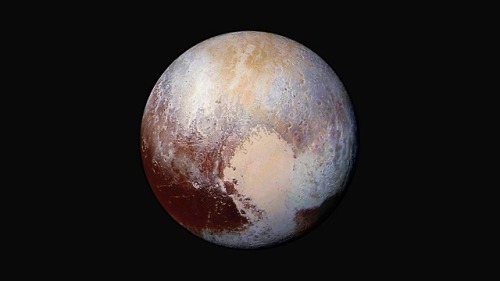

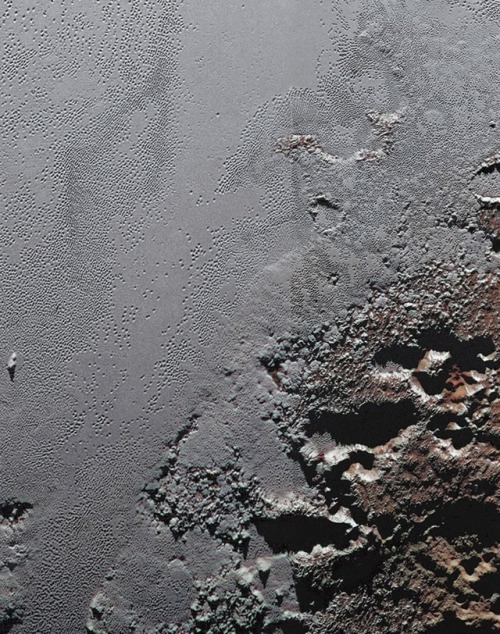
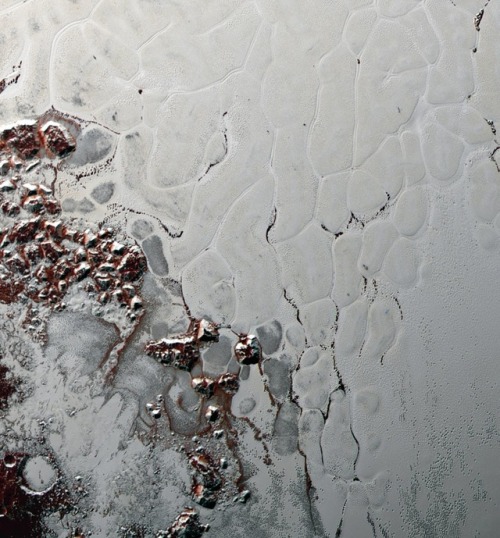
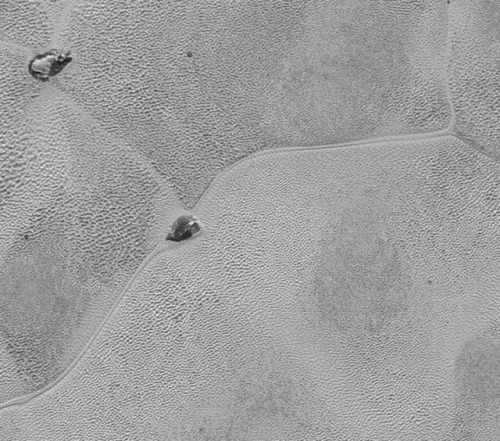
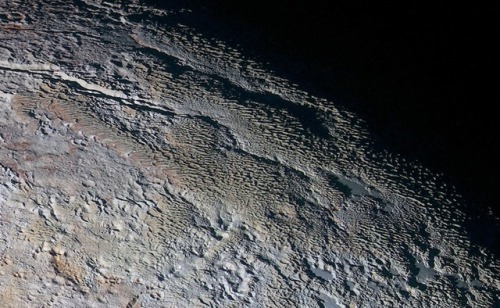
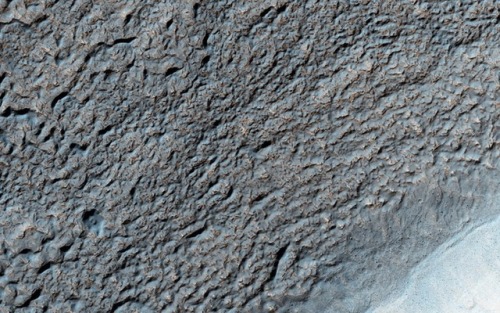
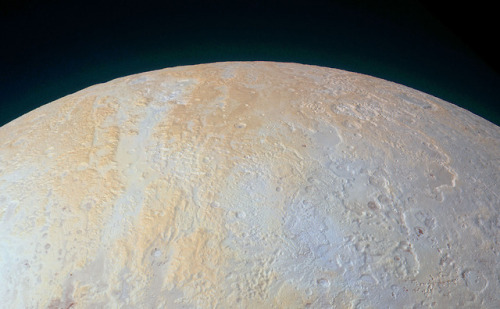
High-resolution images of Pluto taken by NASA’s New Horizons spacecraft.
The plains on Pluto’s surface are composed of more than 98 percent nitrogen ice, with traces of methane and carbon monoxide. Nitrogen and carbon monoxide are most abundant on the anti-Charon face of Pluto (around 180° longitude, where Tombaugh Regio’s western lobe, Sputnik Planitia, is located), whereas methane is most abundant near 300° east. The mountains are made of water ice. Pluto’s surface is quite varied, with large differences in both brightness and color. Pluto is one of the most contrastive bodies in the Solar System, with as much contrast as Saturn’s moon Iapetus. The color varies from charcoal black, to dark orange and white. Pluto’s color is more similar to that of Io with slightly more orange and significantly less red than Mars. Notable geographical features include Tombaugh Regio, or the “Heart” (a large bright area on the side opposite Charon), Cthulhu Macula, or the “Whale” (a large dark area on the trailing hemisphere), and the “Brass Knuckles” (a series of equatorial dark areas on the leading hemisphere). Sputnik Planitia, the western lobe of the “Heart”, is a 1,000 km-wide basin of frozen nitrogen and carbon monoxide ices, divided into polygonal cells, which are interpreted as convection cells that carry floating blocks of water ice crust and sublimation pits towards their margins; there are obvious signs of glacial flows both into and out of the basin. It has no craters that were visible to New Horizons, indicating that its surface is less than 10 million years old.
source | images: NASA/JPL

NGC 3314: When Galaxies Overlap : Why doesn’t the nearby galaxy create a gravitational lensing effect on the background galaxy? It does, but since both galaxies are so nearby, the angular shift is much smaller than the angular sizes of the galaxies themselves. The featured Hubble image of NGC 3314 shows two large spiral galaxies which happen to line up exactly. The foreground spiral NGC 3314a appears nearly face-on with its pinwheel shape defined by young bright star clusters. Against the glow of the background galaxy NGC 3314b, though, dark swirling lanes of interstellar dust can also be seen tracing the nearer spiral’s structure. Both galaxies appear on the edge of the Hydra Cluster of Galaxies, a cluster that is about 200 million light years away. Gravitational lens distortions are much easier to see when the lensing galaxy is smaller and further away. Then, the background galaxy may even be distorted into a ring around the nearer. Fast gravitational lens flashes due to stars in the foreground galaxy momentarily magnifying the light from stars in the background galaxy might one day be visible in future observing campaigns with high-resolution telescopes. via NASA

A Colorful Moon The Moon is normally seen in subtle shades of grey or yellow. But small, measurable color differences have been greatly exaggerated to make this telescopic, multicolored, moonscape captured during the Moon’s full phase. The different colors are recognized to correspond to real differences in the chemical makeup of the lunar surface. Blue hues reveal titanium rich areas while orange and purple colors show regions relatively poor in titanium and iron. The familiar Sea of Tranquility, or Mare Tranquillitatis, is the blue area in the upper right corner of the frame. White lines radiate across the orange-hued southern lunar highlands from 85 kilometer wide ray crater Tycho at bottom left. Above it, darker rays from crater Copernicus extend into the Sea of Rains (Mare Imbrium) at the upper left. Calibrated by rock samples from the Apollo missions, similar multicolor images from spacecraft have been used to explore the Moon’s global surface composition. Image Credit & Copyright: László Francsics
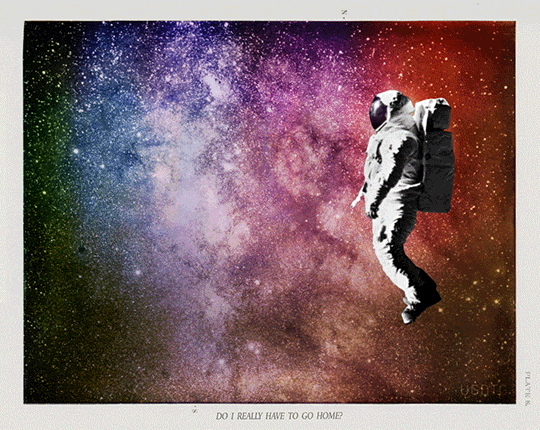
Proposal for GIF IT UP 2016


Reticulating Splines.
Twitter / Instagram / Gumroad / Patreon
KnownOrigin / SuperRare / OBJKT / Zedge
-
 espacio--inerte liked this · 2 weeks ago
espacio--inerte liked this · 2 weeks ago -
 alunderthemist reblogged this · 3 weeks ago
alunderthemist reblogged this · 3 weeks ago -
 enchel reblogged this · 3 weeks ago
enchel reblogged this · 3 weeks ago -
 veronikasavych reblogged this · 3 weeks ago
veronikasavych reblogged this · 3 weeks ago -
 macygrave liked this · 1 month ago
macygrave liked this · 1 month ago -
 drewridgeway liked this · 1 month ago
drewridgeway liked this · 1 month ago -
 axolotlnoise reblogged this · 2 months ago
axolotlnoise reblogged this · 2 months ago -
 ivysdonut liked this · 2 months ago
ivysdonut liked this · 2 months ago -
 laprimera liked this · 3 months ago
laprimera liked this · 3 months ago -
 prima-faci3 reblogged this · 3 months ago
prima-faci3 reblogged this · 3 months ago -
 rokudokei liked this · 4 months ago
rokudokei liked this · 4 months ago -
 honeyb liked this · 4 months ago
honeyb liked this · 4 months ago -
 auraandthefullmoon reblogged this · 5 months ago
auraandthefullmoon reblogged this · 5 months ago -
 paradoxmimzy reblogged this · 5 months ago
paradoxmimzy reblogged this · 5 months ago -
 paradoxmimzy liked this · 5 months ago
paradoxmimzy liked this · 5 months ago -
 king-of-the-deerpeople liked this · 5 months ago
king-of-the-deerpeople liked this · 5 months ago -
 superbpuppylove liked this · 5 months ago
superbpuppylove liked this · 5 months ago -
 nowjunky reblogged this · 5 months ago
nowjunky reblogged this · 5 months ago -
 hurzzuzzrodea liked this · 6 months ago
hurzzuzzrodea liked this · 6 months ago -
 keatsonthebeach liked this · 6 months ago
keatsonthebeach liked this · 6 months ago -
 luppinoshka liked this · 6 months ago
luppinoshka liked this · 6 months ago -
 dutchs-blog liked this · 6 months ago
dutchs-blog liked this · 6 months ago -
 seductiveinsouciance liked this · 6 months ago
seductiveinsouciance liked this · 6 months ago -
 ilmi0labirint0 liked this · 6 months ago
ilmi0labirint0 liked this · 6 months ago -
 zulalimayn liked this · 6 months ago
zulalimayn liked this · 6 months ago -
 suenosyfantasmas liked this · 6 months ago
suenosyfantasmas liked this · 6 months ago -
 lunaperegrina reblogged this · 6 months ago
lunaperegrina reblogged this · 6 months ago -
 lunaperegrina liked this · 6 months ago
lunaperegrina liked this · 6 months ago -
 ruvikdrocell liked this · 6 months ago
ruvikdrocell liked this · 6 months ago -
 annie-lvaz liked this · 6 months ago
annie-lvaz liked this · 6 months ago -
 tangledindream liked this · 6 months ago
tangledindream liked this · 6 months ago -
 epic-flight reblogged this · 7 months ago
epic-flight reblogged this · 7 months ago -
 serenimusic liked this · 7 months ago
serenimusic liked this · 7 months ago -
 joeynewgarden liked this · 7 months ago
joeynewgarden liked this · 7 months ago -
 laurelorel liked this · 7 months ago
laurelorel liked this · 7 months ago -
 lambopticon reblogged this · 7 months ago
lambopticon reblogged this · 7 months ago -
 laurelorel reblogged this · 7 months ago
laurelorel reblogged this · 7 months ago -
 fatalehuntress liked this · 7 months ago
fatalehuntress liked this · 7 months ago -
 sarccaios liked this · 7 months ago
sarccaios liked this · 7 months ago -
 sistinad reblogged this · 7 months ago
sistinad reblogged this · 7 months ago -
 blissmarieee333seaaa liked this · 8 months ago
blissmarieee333seaaa liked this · 8 months ago -
 imjustcurious19 liked this · 8 months ago
imjustcurious19 liked this · 8 months ago -
 blueserpent9 liked this · 8 months ago
blueserpent9 liked this · 8 months ago -
 opalglimmer reblogged this · 8 months ago
opalglimmer reblogged this · 8 months ago -
 eyawey reblogged this · 8 months ago
eyawey reblogged this · 8 months ago -
 emathevampire reblogged this · 8 months ago
emathevampire reblogged this · 8 months ago -
 paradoxmimzy reblogged this · 8 months ago
paradoxmimzy reblogged this · 8 months ago -
 lovingsaladfishauthor liked this · 8 months ago
lovingsaladfishauthor liked this · 8 months ago
